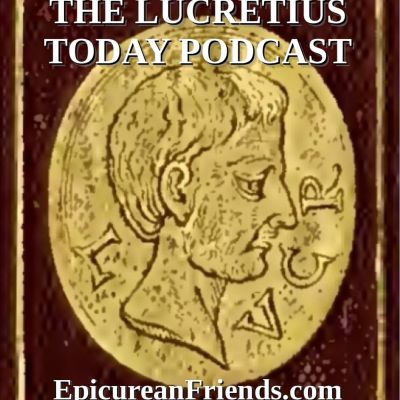Lucretius Today is a podcast dedicated to learning Epicurean philosophy through study of the poet Lucretius, who lived in the age of Julius Caesar and wrote "On The Nature of Things," the only complete presentation of Epicurus' ideas left to us from the ancient world. We'll walk you line by line through the six books of Lucretius' poem, and we'll discuss how Epicurean philosophy can apply to you today. In this podcast we won't be talking about modern political issues. How you apply Epicurus in your own life is entirely up to you. Over at the Epicureanfriends.com web forum, we apply this approach by following a set of ground rules we call "Not Neo-Epicurean, But Epicurean." Epicurean philosophy is not a religion, it''s not Stoicism, it's not Humanism, it's not Libertarianism, it's not Atheism, and it's not Marxism or any other philosophy - it is unique in the history of Western Civilization, and as we explore Lucretius's poem you'll quickly see how that is the case. The home page of this podcast is LucretiusToday...
http://Epicureanfriends.com
Episode 139 - Letter to Menoeceus 06 - On Pleasure (Part Two)
Welcome to Episode One Hundred Thirty-Nine of Lucretius Today. This is a podcast dedicated to the poet Lucretius, who wrote "On The Nature of Things," the only complete presentation of Epicurean philosophy left to us from the ancient world. I am your host Cassius, and together with our panelists from the EpicureanFriends.com forum, we'll walk you through the ancient Epicurean texts, and we'll discuss how Epicurean philosophy can apply to you today. We encourage you to study Epicurus for yourself, and we suggest the best place to start is the book "Epicurus and His Philosophy" by Canadian professor Norman DeWitt. If you find the Epicurean worldview attractive, we invite you to join us in the study of Epicurus at EpicureanFriends.com, where you will find a discussion thread for each of our podcast episodes and many other topics. Today we continue our discussion of Pleasure in Epicurus' Letter to Menoeceus. Now let's join Joshua reading today's text:
BAILEY:
And again independence of desire we think a great good — not that we may at all times enjoy but a few things, but that, if we do not possess many, we may enjoy the few in the genuine persuasion that those have the sweetest pleasure in luxury who least need it, and that all that is natural is easy to be obtained, but that which is superfluous is hard. And so plain savours bring us a pleasure equal to a luxurious diet, when all the pain due to want is removed; and bread and water produce the highest pleasure, when one who needs them puts them to his lips.
[131] To grow accustomed therefore to simple and not luxurious diet gives us health to the full, and makes a man alert for the needful employments of life, and when after long intervals we approach luxuries disposes us better towards them, and fits us to be fearless of fortune.
When, therefore, we maintain that pleasure is the end, we do not mean the pleasures of profligates and those that consist in sensuality, as is supposed by some who are either ignorant or disagree with us or do not understand, but freedom from pain in the body and from trouble in the mind.
[132] For it is not continuous drinkings and revelings, nor the satisfaction of lusts, nor the enjoyment of fish and other luxuries of the wealthy table, which produce a pleasant life, but sober reasoning, searching out the motives for all choice and avoidance, and banishing mere opinions, to which are due the greatest disturbance of the spirit.
Of all this the beginning and the greatest good is prudence. Wherefore prudence is a more precious thing even than philosophy: for from prudence are sprung all the other virtues, and it teaches us that it is not possible to live pleasantly without living prudently and honorably and justly, (nor, again, to live a life of prudence, honor, and justice) without living pleasantly. For the virtues are by nature bound up with the pleasant life, and the pleasant life is inseparable from them.
